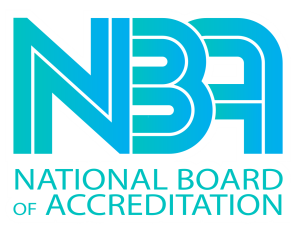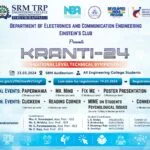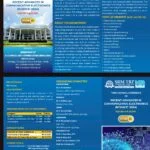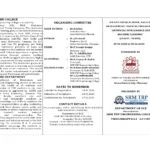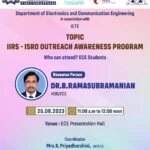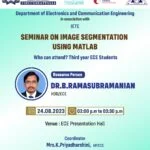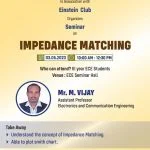Please sign in first
Not a member?
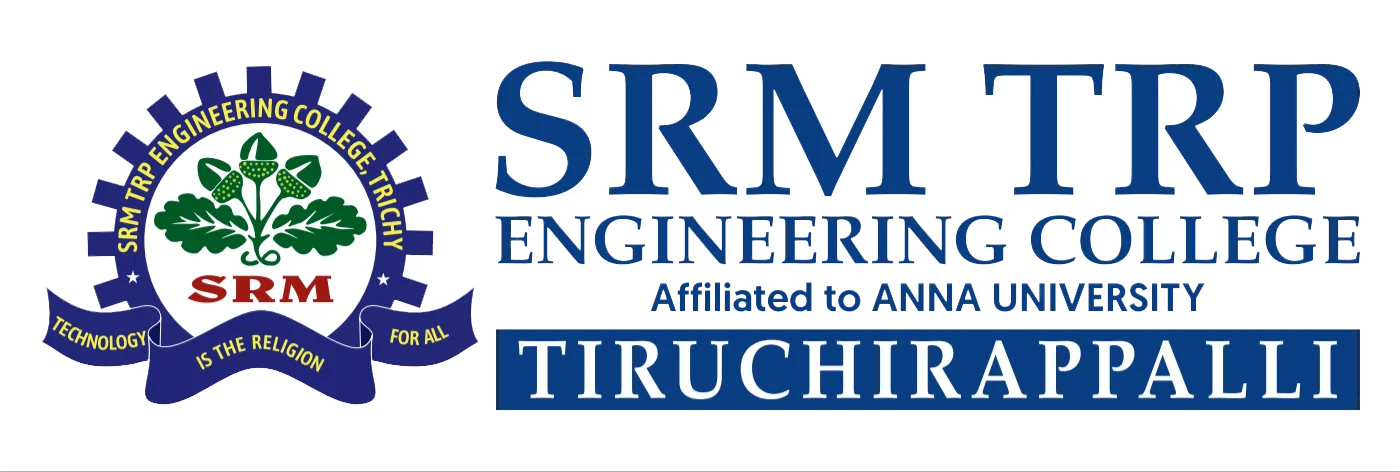
- Home
- About
- Academics
- Research
- Placement
- Admissions
- International Relations
- LIFE @ SRM TRP EC
About The Department
The Department of Electronics and Communication Engineering came in to existence in the year 2010. The department has Undergraduate programme (B.E.) in Electronics & Communication Engineering, Post Graduate programme (M.E.) in VLSI Design and Doctoral programme (Ph.D.) in Electronics & Communication Engineering offering high class technical experience to the students and scholars. In 2021, B.E. ECE Program has been accredited for 3 years by National Board of Accreditation (NBA). The faculty members in the department are highly qualified and specialized in VLSI Design, Embedded Systems, Internet of Things, Machine Learning, Wireless Sensor Networks, Antenna Design, Digital Image Processing and Wireless Communication. The department has state-of-the-art laboratories enabling students to get hands on experience in modern engineering tools and attain excellence in research and academics.
Vision of the Department
“To be a globally recognized centre for education and research in the field of electronics and communication engineering, by indulging students with their technological innovation to serve the society.”
Mission of the Department
-
M1: To provide students with an excellent education in core and associated disciplines of Electronics and Communication Engineering.
-
M2: To incite passion for excellence in emerging research areas among faculty and students.
-
M3: To establish a bridge between academia and industry by incorporating employable skills among students.
-
M4: To enrich the Students with Broad Intellectual Spectra Pertaining to the Sustainable Development Goals.
-
M5: To cultivate a passion for lifelong learning in technocrats to succeed in their chosen field.
PROGRAMS OFFERED
B.E. - Electronics and Communication Engineering
M.E. - VLSI Design
Ph. D. - Electronics and Communication Engineering
PROGRAM EDUCATIONAL OBJECTIVES (PEOs)
The graduate of Electronics and Communication Engineering will have,
• PEO 1: To provide knowledge in mathematical, scientific and engineering concepts to achieve successful career path in corporate scenario.
• PEO 2: To enable students with the capability to analyze, design, develop, optimize and to implement electronic gadgets with domain knowledge of Electronics and Communication Engineering.
• PEO 3: To nurture and consolidate the knowledge in various domains that affords solutions for real time problems with an understanding on its economical, environmental and social impacts.
• PEO 4: To inculcate core knowledge with ethical values to work in a multi-fascinated environment exhibiting professionalism in career and to excel in every aspect with leadership.
• PEO 5: To imbibe persistent lifelong learning with amenable etiquette in emerging technologies to proliferate their skills for professional excellence and in research and innovations.
PROGRAM OUTCOMES (POs)
• PO1: Engineering knowledge: Apply the knowledge of mathematics, science, engineering fundamentals, and electronics and communication engineering to solve complex problems.
• PO2: Problem analysis: Identify, formulate, review research literature and analyze complex problems in electronics and communication engineering domain to reach substantiated conclusions using principles of mathematics, natural sciences and engineering sciences.
• PO3: Design/development of solutions: Develop solutions for composite problems in Electronics and Communication engineering and design system components or processes that meet the specified needs with appropriate consideration for the public health and safety, cultural, societal, and environmental considerations.
• PO4: Investigation: Use research-based knowledge & methods of Electronics and Communication, including design of experiments, analysis and interpretation of data, and synthesis of information to provide valid conclusions.
• PO5: Modern tool usage: Create, select, and apply appropriate techniques, resources, and modern engineering tools including prediction and modeling to complex engineering activities with an understanding of the limitations.
• PO6: The Engineer and society: Apply reasoning informed by the contextual knowledge of Electronics and Communication to assess societal, health, safety, legal and cultural issues and consequent responsibilities relevant to the professional engineering practice.
• PO7: Environment and sustainability: Understand the impact of the professional engineering solutions in societal and environmental contexts and demonstrate the knowledge, and need for sustainable development.
• PO8: Ethics: Ability to have ethical principles, responsibilities and norms of the engineering practice.
• PO9: Individual and team work: The professional must visualize and function effectively as an individual and as member or leader in diverse teams and in multidisciplinary settings.
• PO10: Communications: Communicate effectively on complex engineering activities with engineering community and able to comprehend effective reports, design documentation, make effective presentations and give clear instructions.
• PO11: Project management and finance: Demonstrate engineering knowledge and understanding of management principles and apply these to manage projects in multidisciplinary environments.
• PO12: Life-long learning: Develop interest towards continuous education throughout their life.
PROGRAM EDUCATIONAL OBJECTIVES (PEOs)
The graduate of Electronics and Communication Engineering will have,
PEO1: To critically analyse and understand the principles involved in the designing and testing of electronic circuits relevant to industry and society.
PEO2: To appreciate the concepts in the working of electronic circuits.
PEO3: To take up socially relevant and challenging projects and to provide Innovative solutions through research for the benefit of the society with latest hardware & software related to VLSI and also to develop the capacity to protect Intellectual Property.
PEO4: To Progress and Develop with Ethics and Communicate effectively.
PEO5: To become entrepreneurs to develop indigenous solutions.
PROGRAM OUTCOMES (POs)
PO1: An ability to independently carry out research/investigation and development work to solve practical problems
PO2: An ability to write and present a substantial technical report/document
PO3: Students should be able to demonstrate a degree of mastery over the area as per the specialization of the program. The mastery should be at a level higher than the requirements in the appropriate bachelor program
PO4: Understand the fundamentals involved in the Designing and Testing of electronic circuits in the VLSI domain.
PO5: Provide solutions through research to socially relevant issues for modern Electronic Design Automation (EDA) tools with knowledge, techniques, skills and for the benefit of the society
PO6: Interact effectively with the technical experts in industry and society
| S.No. | Name of the Recognized Ph.D Supervisor | Supervisor Reference Number |
|---|---|---|
| 1 |  Dr. C. Chellaswamy Professor | 4040060 |
| 2 |  Dr. P. Thiruvalar Selvan Professor | 2340400 |
| 3 |  Dr. K. Uma Maheswari Professor | 3340044 |
